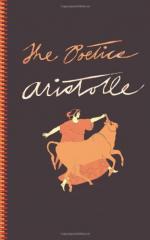
|
| Name: _________________________ | Period: ___________________ |
This quiz consists of 5 multiple choice and 5 short answer questions through Section II.
Multiple Choice Questions
1. In art, Aristotle defines the medium as what?
(a) The manner in which the art is produced.
(b) The average.
(c) A middle state or condition.
(d) The artist's spiritual inspiration.
2. According to Aristotle, how does tragedy achieve the emotion it inspires?
(a) Deceit.
(b) Contradiction.
(c) Irony.
(d) Using the element of surprise.
3. Based on Aristotle's teachings, why do some tragedies use certain effects when performed on stage?
(a) Because they are "silent" tragedies.
(b) To impress their spectators.
(c) To justify higher ticket prices.
(d) To express language visually.
4. Aristotle explains that actions described in a tragic plot should have certain characteristics. Which one of the following is NOT one of the characteristics that Aristotle identifies?
(a) Actions should help the reader grasp the significance of the whole.
(b) Actions should be not too small or too large.
(c) Actions should be interesting.
(d) Actions should be minute and trivial.
5. What does Aristotle say about the element of surprise in a tragedy?
(a) It helps inspire joy.
(b) It helps inspire sadness.
(c) It keeps the reader guessing and interested.
(d) It helps inspire pity.
Short Answer Questions
1. What type of tragedy does Aristotle say does NOT require impressive visual effects when performed on stage to impress their spectators?
2. A character attempting to save his friend but accidentally killing him instead is an example Aristotle gives for what?
3. What does Aristotle consider to be the most tragic event?
4. Aristotle explains that tragedy is not only concerned with the depiction of just any action, but of actions that inspire what?
5. According to Aristotle, a great plot consists of an action that almost occurs, but doesn't because of what?
|
This section contains 317 words (approx. 2 pages at 300 words per page) |

|




